Evaluating Leadership and Management: Grosvenor Hotel Case Study
VerifiedAdded on 2023/01/04
|9
|2759
|39
Report
AI Summary
This report analyzes the management and organizational behavior within the Grosvenor Hotel Torquay, focusing on the leadership style of General Manager Mark Jenkins. It examines the hotel's organizational structure, culture, and the impact of these elements on productivity. The report critiques Mark Jenkins' unorthodox and often autocratic leadership, highlighting both his strengths in problem-solving and his weaknesses in people management and decision-making. It explores various leadership models, including team-oriented, authoritarian, transactional, and transformational styles, and assesses their relevance to the hotel's performance. The report then proposes recommendations for Mark Jenkins, based on teamwork models such as Tuckman's stages of team development and the STAR model, aiming to improve his people management skills, foster better teamwork, and enhance overall hotel operations. The analysis covers organizational structure, culture, and the impact on productivity. The report concludes with a call for improved leadership and management practices to address issues like employee dissatisfaction, service quality, and operational inefficiencies.
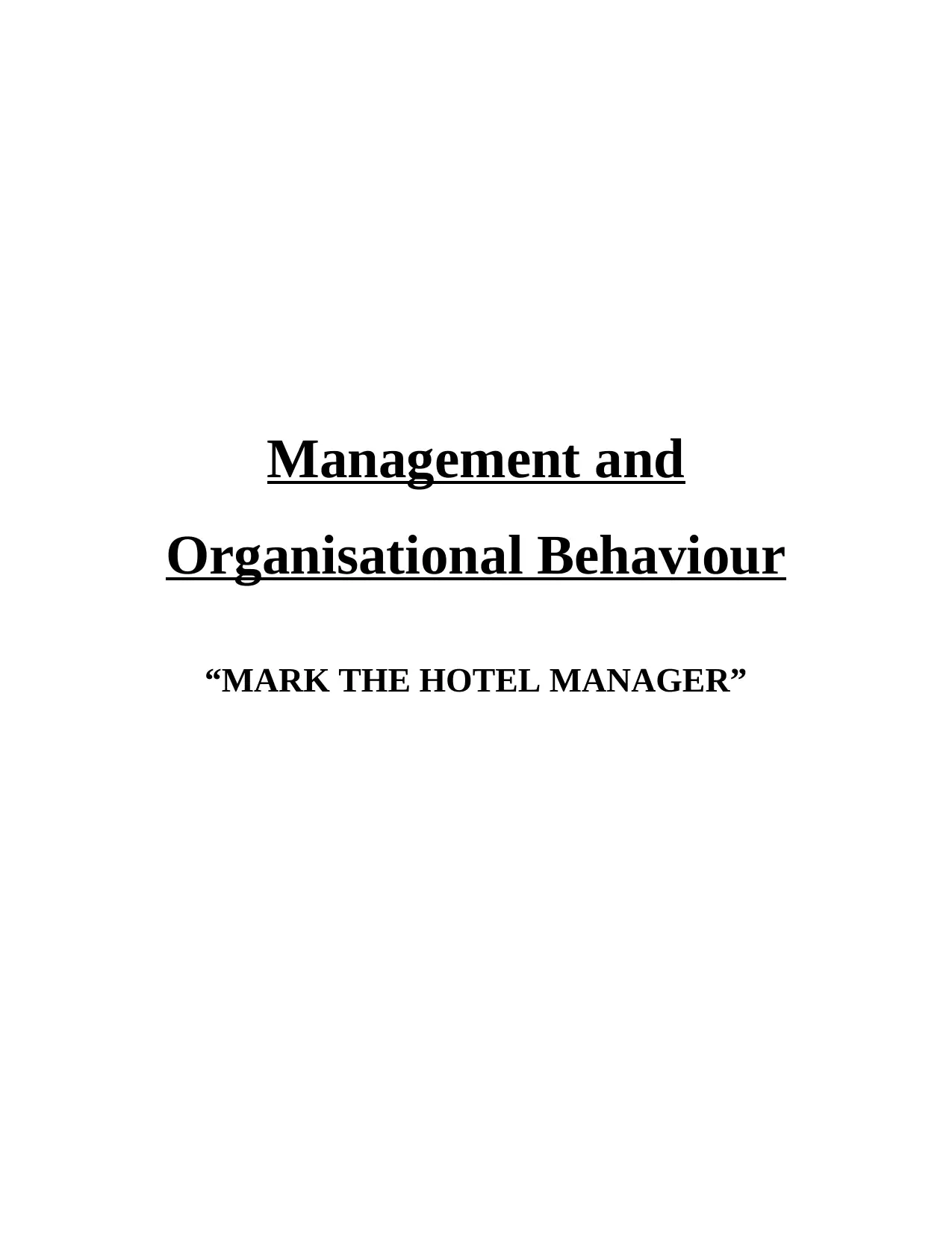
Management and
Organisational Behaviour
“MARK THE HOTEL MANAGER”
Organisational Behaviour
“MARK THE HOTEL MANAGER”
Paraphrase This Document
Need a fresh take? Get an instant paraphrase of this document with our AI Paraphraser
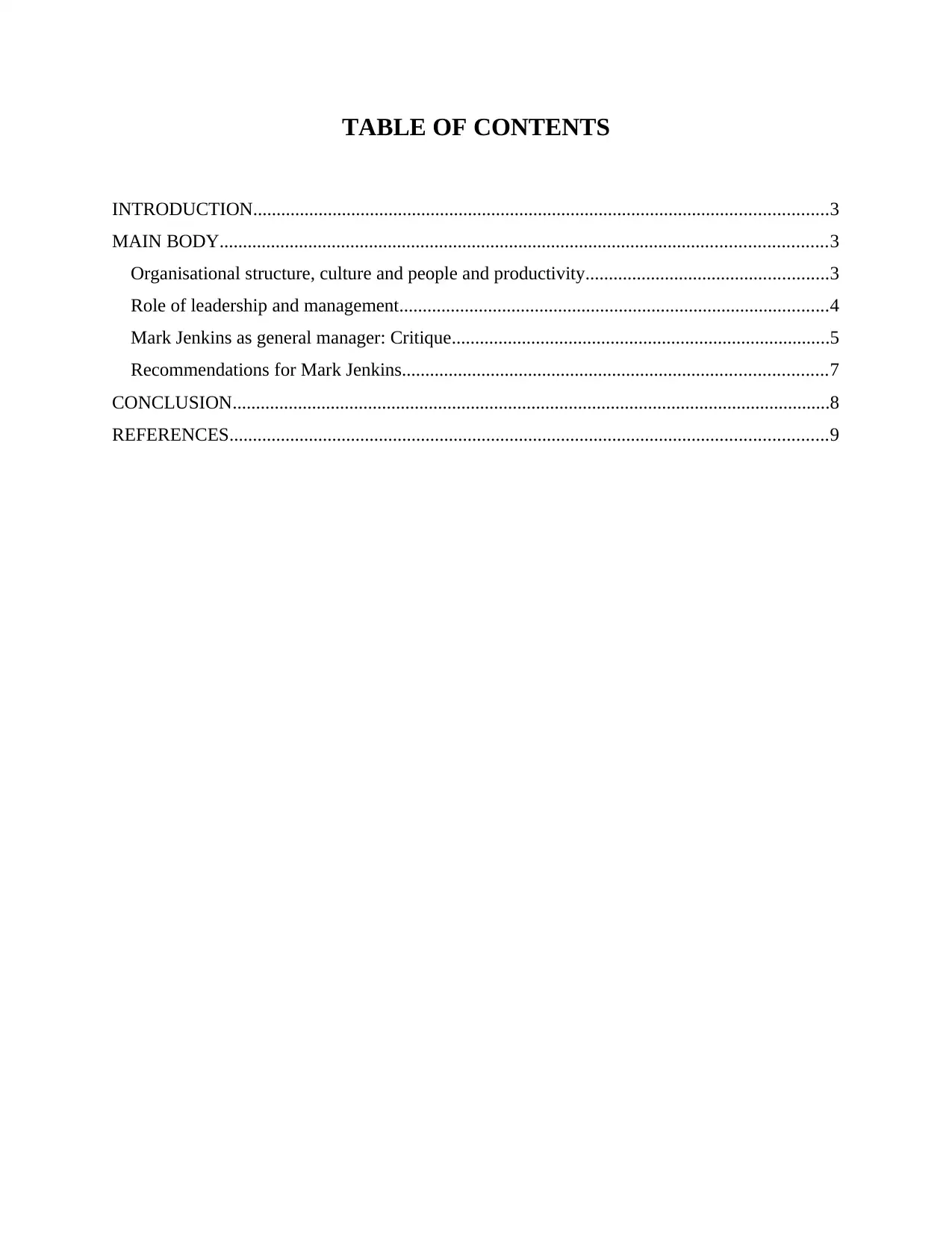
TABLE OF CONTENTS
INTRODUCTION...........................................................................................................................3
MAIN BODY..................................................................................................................................3
Organisational structure, culture and people and productivity....................................................3
Role of leadership and management............................................................................................4
Mark Jenkins as general manager: Critique.................................................................................5
Recommendations for Mark Jenkins...........................................................................................7
CONCLUSION................................................................................................................................8
REFERENCES................................................................................................................................9
INTRODUCTION...........................................................................................................................3
MAIN BODY..................................................................................................................................3
Organisational structure, culture and people and productivity....................................................3
Role of leadership and management............................................................................................4
Mark Jenkins as general manager: Critique.................................................................................5
Recommendations for Mark Jenkins...........................................................................................7
CONCLUSION................................................................................................................................8
REFERENCES................................................................................................................................9
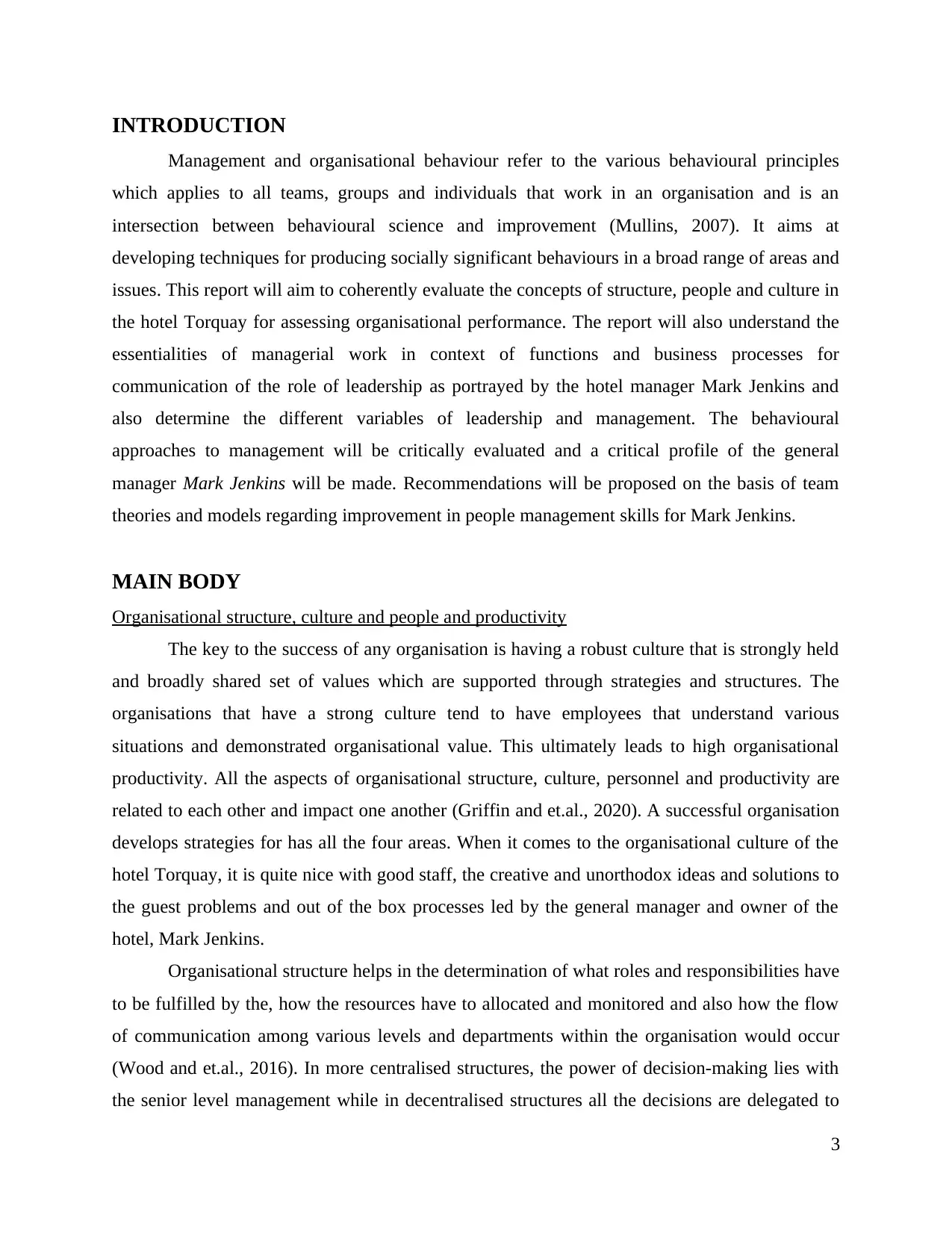
INTRODUCTION
Management and organisational behaviour refer to the various behavioural principles
which applies to all teams, groups and individuals that work in an organisation and is an
intersection between behavioural science and improvement (Mullins, 2007). It aims at
developing techniques for producing socially significant behaviours in a broad range of areas and
issues. This report will aim to coherently evaluate the concepts of structure, people and culture in
the hotel Torquay for assessing organisational performance. The report will also understand the
essentialities of managerial work in context of functions and business processes for
communication of the role of leadership as portrayed by the hotel manager Mark Jenkins and
also determine the different variables of leadership and management. The behavioural
approaches to management will be critically evaluated and a critical profile of the general
manager Mark Jenkins will be made. Recommendations will be proposed on the basis of team
theories and models regarding improvement in people management skills for Mark Jenkins.
MAIN BODY
Organisational structure, culture and people and productivity
The key to the success of any organisation is having a robust culture that is strongly held
and broadly shared set of values which are supported through strategies and structures. The
organisations that have a strong culture tend to have employees that understand various
situations and demonstrated organisational value. This ultimately leads to high organisational
productivity. All the aspects of organisational structure, culture, personnel and productivity are
related to each other and impact one another (Griffin and et.al., 2020). A successful organisation
develops strategies for has all the four areas. When it comes to the organisational culture of the
hotel Torquay, it is quite nice with good staff, the creative and unorthodox ideas and solutions to
the guest problems and out of the box processes led by the general manager and owner of the
hotel, Mark Jenkins.
Organisational structure helps in the determination of what roles and responsibilities have
to be fulfilled by the, how the resources have to allocated and monitored and also how the flow
of communication among various levels and departments within the organisation would occur
(Wood and et.al., 2016). In more centralised structures, the power of decision-making lies with
the senior level management while in decentralised structures all the decisions are delegated to
3
Management and organisational behaviour refer to the various behavioural principles
which applies to all teams, groups and individuals that work in an organisation and is an
intersection between behavioural science and improvement (Mullins, 2007). It aims at
developing techniques for producing socially significant behaviours in a broad range of areas and
issues. This report will aim to coherently evaluate the concepts of structure, people and culture in
the hotel Torquay for assessing organisational performance. The report will also understand the
essentialities of managerial work in context of functions and business processes for
communication of the role of leadership as portrayed by the hotel manager Mark Jenkins and
also determine the different variables of leadership and management. The behavioural
approaches to management will be critically evaluated and a critical profile of the general
manager Mark Jenkins will be made. Recommendations will be proposed on the basis of team
theories and models regarding improvement in people management skills for Mark Jenkins.
MAIN BODY
Organisational structure, culture and people and productivity
The key to the success of any organisation is having a robust culture that is strongly held
and broadly shared set of values which are supported through strategies and structures. The
organisations that have a strong culture tend to have employees that understand various
situations and demonstrated organisational value. This ultimately leads to high organisational
productivity. All the aspects of organisational structure, culture, personnel and productivity are
related to each other and impact one another (Griffin and et.al., 2020). A successful organisation
develops strategies for has all the four areas. When it comes to the organisational culture of the
hotel Torquay, it is quite nice with good staff, the creative and unorthodox ideas and solutions to
the guest problems and out of the box processes led by the general manager and owner of the
hotel, Mark Jenkins.
Organisational structure helps in the determination of what roles and responsibilities have
to be fulfilled by the, how the resources have to allocated and monitored and also how the flow
of communication among various levels and departments within the organisation would occur
(Wood and et.al., 2016). In more centralised structures, the power of decision-making lies with
the senior level management while in decentralised structures all the decisions are delegated to
3
⊘ This is a preview!⊘
Do you want full access?
Subscribe today to unlock all pages.

Trusted by 1+ million students worldwide
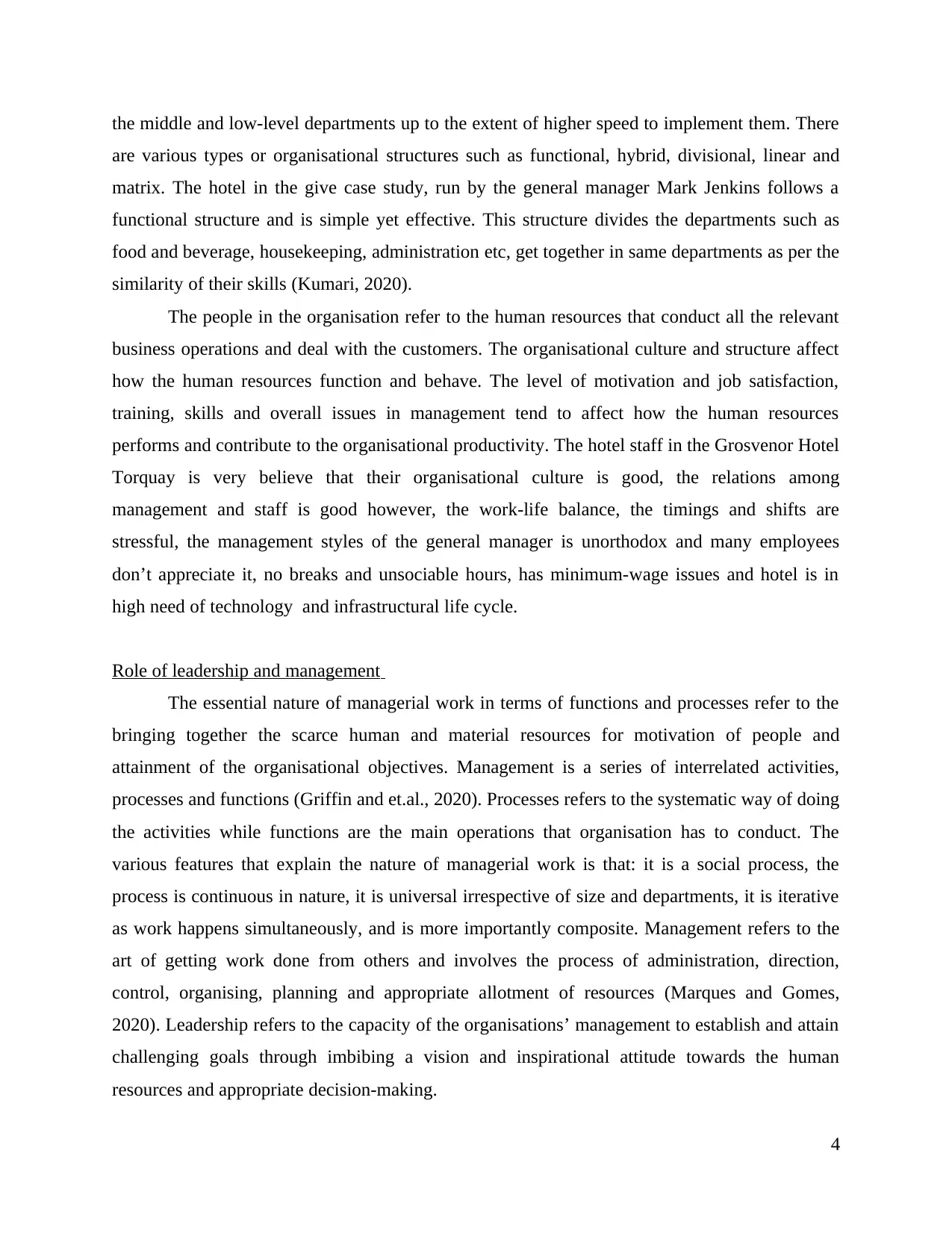
the middle and low-level departments up to the extent of higher speed to implement them. There
are various types or organisational structures such as functional, hybrid, divisional, linear and
matrix. The hotel in the give case study, run by the general manager Mark Jenkins follows a
functional structure and is simple yet effective. This structure divides the departments such as
food and beverage, housekeeping, administration etc, get together in same departments as per the
similarity of their skills (Kumari, 2020).
The people in the organisation refer to the human resources that conduct all the relevant
business operations and deal with the customers. The organisational culture and structure affect
how the human resources function and behave. The level of motivation and job satisfaction,
training, skills and overall issues in management tend to affect how the human resources
performs and contribute to the organisational productivity. The hotel staff in the Grosvenor Hotel
Torquay is very believe that their organisational culture is good, the relations among
management and staff is good however, the work-life balance, the timings and shifts are
stressful, the management styles of the general manager is unorthodox and many employees
don’t appreciate it, no breaks and unsociable hours, has minimum-wage issues and hotel is in
high need of technology and infrastructural life cycle.
Role of leadership and management
The essential nature of managerial work in terms of functions and processes refer to the
bringing together the scarce human and material resources for motivation of people and
attainment of the organisational objectives. Management is a series of interrelated activities,
processes and functions (Griffin and et.al., 2020). Processes refers to the systematic way of doing
the activities while functions are the main operations that organisation has to conduct. The
various features that explain the nature of managerial work is that: it is a social process, the
process is continuous in nature, it is universal irrespective of size and departments, it is iterative
as work happens simultaneously, and is more importantly composite. Management refers to the
art of getting work done from others and involves the process of administration, direction,
control, organising, planning and appropriate allotment of resources (Marques and Gomes,
2020). Leadership refers to the capacity of the organisations’ management to establish and attain
challenging goals through imbibing a vision and inspirational attitude towards the human
resources and appropriate decision-making.
4
are various types or organisational structures such as functional, hybrid, divisional, linear and
matrix. The hotel in the give case study, run by the general manager Mark Jenkins follows a
functional structure and is simple yet effective. This structure divides the departments such as
food and beverage, housekeeping, administration etc, get together in same departments as per the
similarity of their skills (Kumari, 2020).
The people in the organisation refer to the human resources that conduct all the relevant
business operations and deal with the customers. The organisational culture and structure affect
how the human resources function and behave. The level of motivation and job satisfaction,
training, skills and overall issues in management tend to affect how the human resources
performs and contribute to the organisational productivity. The hotel staff in the Grosvenor Hotel
Torquay is very believe that their organisational culture is good, the relations among
management and staff is good however, the work-life balance, the timings and shifts are
stressful, the management styles of the general manager is unorthodox and many employees
don’t appreciate it, no breaks and unsociable hours, has minimum-wage issues and hotel is in
high need of technology and infrastructural life cycle.
Role of leadership and management
The essential nature of managerial work in terms of functions and processes refer to the
bringing together the scarce human and material resources for motivation of people and
attainment of the organisational objectives. Management is a series of interrelated activities,
processes and functions (Griffin and et.al., 2020). Processes refers to the systematic way of doing
the activities while functions are the main operations that organisation has to conduct. The
various features that explain the nature of managerial work is that: it is a social process, the
process is continuous in nature, it is universal irrespective of size and departments, it is iterative
as work happens simultaneously, and is more importantly composite. Management refers to the
art of getting work done from others and involves the process of administration, direction,
control, organising, planning and appropriate allotment of resources (Marques and Gomes,
2020). Leadership refers to the capacity of the organisations’ management to establish and attain
challenging goals through imbibing a vision and inspirational attitude towards the human
resources and appropriate decision-making.
4
Paraphrase This Document
Need a fresh take? Get an instant paraphrase of this document with our AI Paraphraser
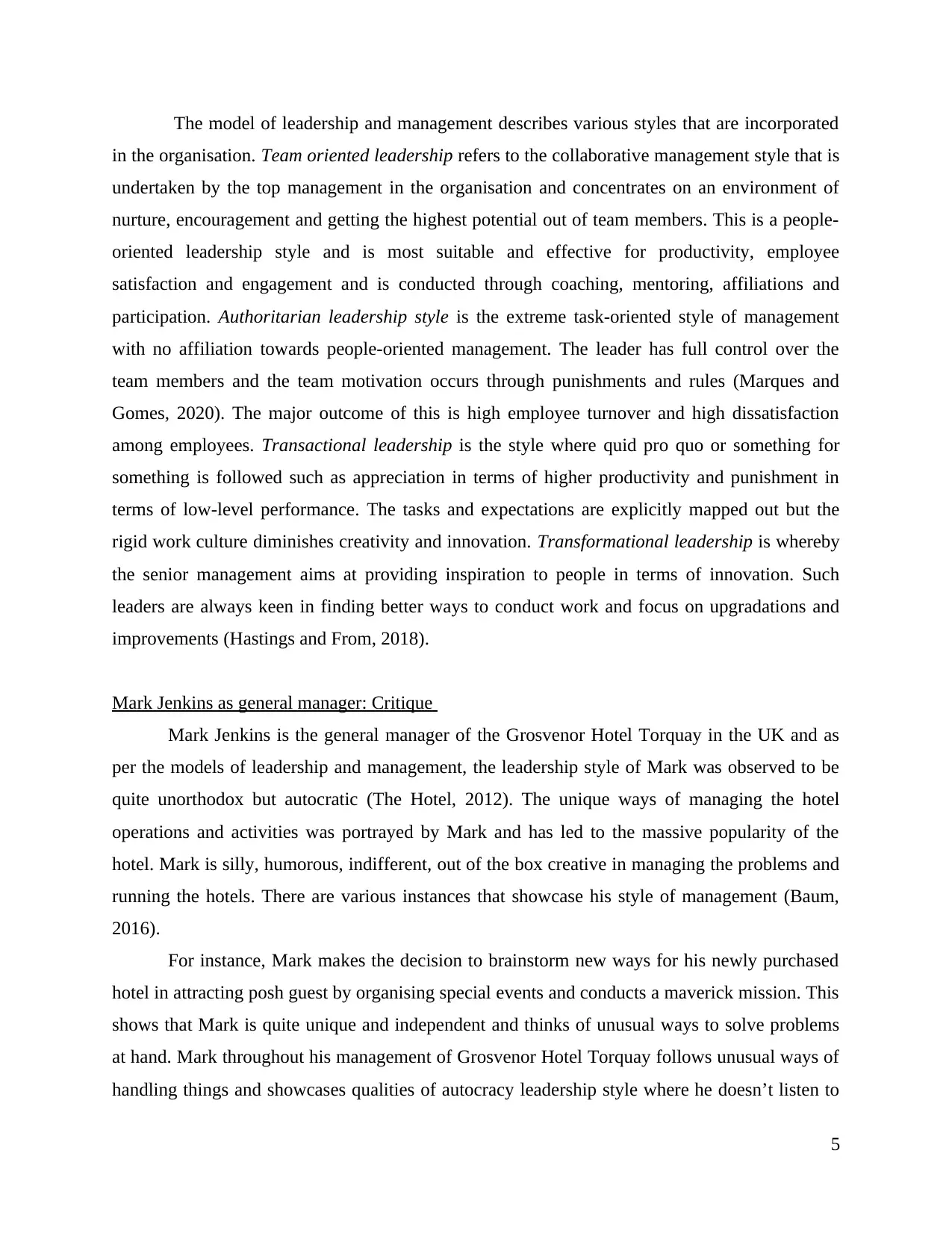
The model of leadership and management describes various styles that are incorporated
in the organisation. Team oriented leadership refers to the collaborative management style that is
undertaken by the top management in the organisation and concentrates on an environment of
nurture, encouragement and getting the highest potential out of team members. This is a people-
oriented leadership style and is most suitable and effective for productivity, employee
satisfaction and engagement and is conducted through coaching, mentoring, affiliations and
participation. Authoritarian leadership style is the extreme task-oriented style of management
with no affiliation towards people-oriented management. The leader has full control over the
team members and the team motivation occurs through punishments and rules (Marques and
Gomes, 2020). The major outcome of this is high employee turnover and high dissatisfaction
among employees. Transactional leadership is the style where quid pro quo or something for
something is followed such as appreciation in terms of higher productivity and punishment in
terms of low-level performance. The tasks and expectations are explicitly mapped out but the
rigid work culture diminishes creativity and innovation. Transformational leadership is whereby
the senior management aims at providing inspiration to people in terms of innovation. Such
leaders are always keen in finding better ways to conduct work and focus on upgradations and
improvements (Hastings and From, 2018).
Mark Jenkins as general manager: Critique
Mark Jenkins is the general manager of the Grosvenor Hotel Torquay in the UK and as
per the models of leadership and management, the leadership style of Mark was observed to be
quite unorthodox but autocratic (The Hotel, 2012). The unique ways of managing the hotel
operations and activities was portrayed by Mark and has led to the massive popularity of the
hotel. Mark is silly, humorous, indifferent, out of the box creative in managing the problems and
running the hotels. There are various instances that showcase his style of management (Baum,
2016).
For instance, Mark makes the decision to brainstorm new ways for his newly purchased
hotel in attracting posh guest by organising special events and conducts a maverick mission. This
shows that Mark is quite unique and independent and thinks of unusual ways to solve problems
at hand. Mark throughout his management of Grosvenor Hotel Torquay follows unusual ways of
handling things and showcases qualities of autocracy leadership style where he doesn’t listen to
5
in the organisation. Team oriented leadership refers to the collaborative management style that is
undertaken by the top management in the organisation and concentrates on an environment of
nurture, encouragement and getting the highest potential out of team members. This is a people-
oriented leadership style and is most suitable and effective for productivity, employee
satisfaction and engagement and is conducted through coaching, mentoring, affiliations and
participation. Authoritarian leadership style is the extreme task-oriented style of management
with no affiliation towards people-oriented management. The leader has full control over the
team members and the team motivation occurs through punishments and rules (Marques and
Gomes, 2020). The major outcome of this is high employee turnover and high dissatisfaction
among employees. Transactional leadership is the style where quid pro quo or something for
something is followed such as appreciation in terms of higher productivity and punishment in
terms of low-level performance. The tasks and expectations are explicitly mapped out but the
rigid work culture diminishes creativity and innovation. Transformational leadership is whereby
the senior management aims at providing inspiration to people in terms of innovation. Such
leaders are always keen in finding better ways to conduct work and focus on upgradations and
improvements (Hastings and From, 2018).
Mark Jenkins as general manager: Critique
Mark Jenkins is the general manager of the Grosvenor Hotel Torquay in the UK and as
per the models of leadership and management, the leadership style of Mark was observed to be
quite unorthodox but autocratic (The Hotel, 2012). The unique ways of managing the hotel
operations and activities was portrayed by Mark and has led to the massive popularity of the
hotel. Mark is silly, humorous, indifferent, out of the box creative in managing the problems and
running the hotels. There are various instances that showcase his style of management (Baum,
2016).
For instance, Mark makes the decision to brainstorm new ways for his newly purchased
hotel in attracting posh guest by organising special events and conducts a maverick mission. This
shows that Mark is quite unique and independent and thinks of unusual ways to solve problems
at hand. Mark throughout his management of Grosvenor Hotel Torquay follows unusual ways of
handling things and showcases qualities of autocracy leadership style where he doesn’t listen to
5
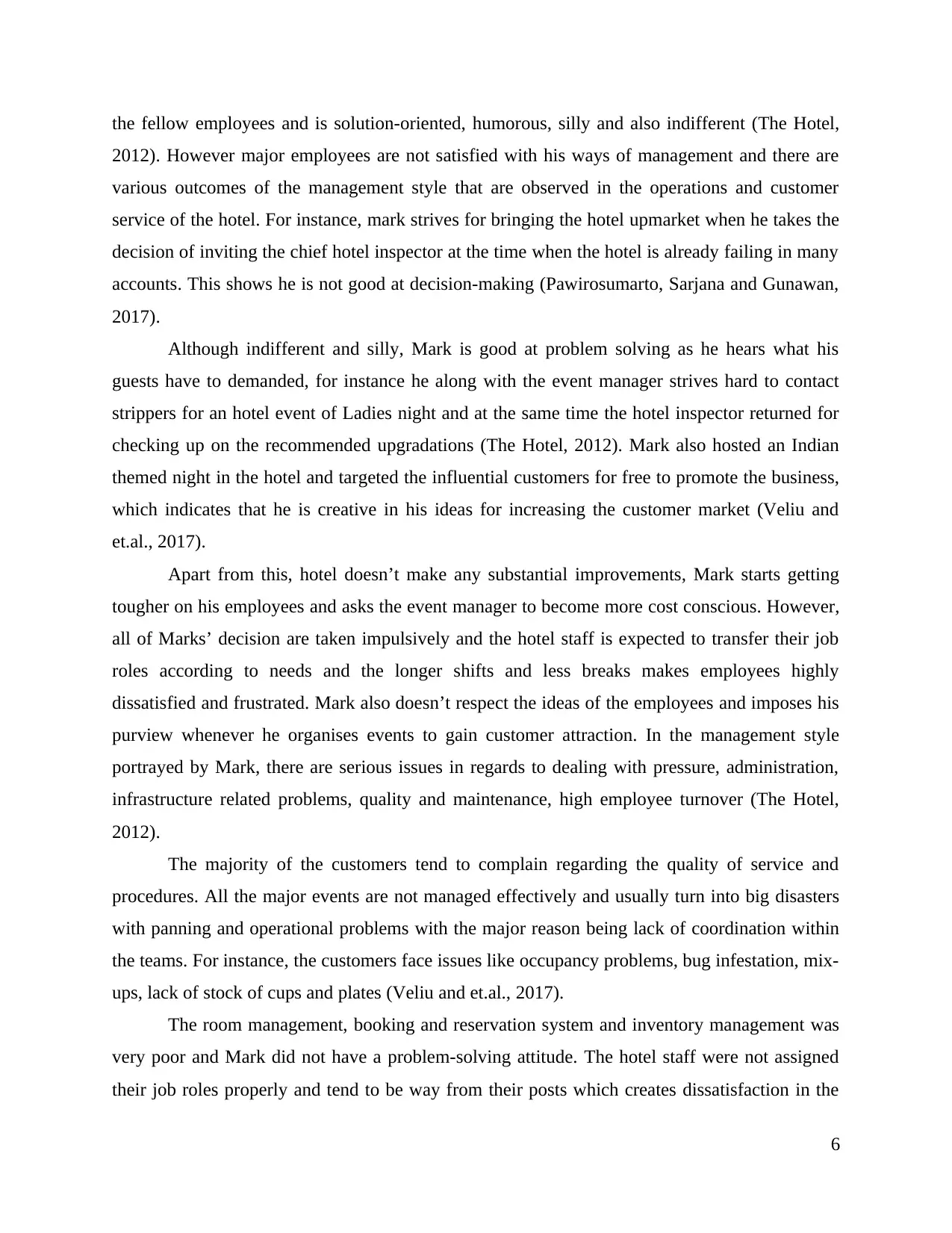
the fellow employees and is solution-oriented, humorous, silly and also indifferent (The Hotel,
2012). However major employees are not satisfied with his ways of management and there are
various outcomes of the management style that are observed in the operations and customer
service of the hotel. For instance, mark strives for bringing the hotel upmarket when he takes the
decision of inviting the chief hotel inspector at the time when the hotel is already failing in many
accounts. This shows he is not good at decision-making (Pawirosumarto, Sarjana and Gunawan,
2017).
Although indifferent and silly, Mark is good at problem solving as he hears what his
guests have to demanded, for instance he along with the event manager strives hard to contact
strippers for an hotel event of Ladies night and at the same time the hotel inspector returned for
checking up on the recommended upgradations (The Hotel, 2012). Mark also hosted an Indian
themed night in the hotel and targeted the influential customers for free to promote the business,
which indicates that he is creative in his ideas for increasing the customer market (Veliu and
et.al., 2017).
Apart from this, hotel doesn’t make any substantial improvements, Mark starts getting
tougher on his employees and asks the event manager to become more cost conscious. However,
all of Marks’ decision are taken impulsively and the hotel staff is expected to transfer their job
roles according to needs and the longer shifts and less breaks makes employees highly
dissatisfied and frustrated. Mark also doesn’t respect the ideas of the employees and imposes his
purview whenever he organises events to gain customer attraction. In the management style
portrayed by Mark, there are serious issues in regards to dealing with pressure, administration,
infrastructure related problems, quality and maintenance, high employee turnover (The Hotel,
2012).
The majority of the customers tend to complain regarding the quality of service and
procedures. All the major events are not managed effectively and usually turn into big disasters
with panning and operational problems with the major reason being lack of coordination within
the teams. For instance, the customers face issues like occupancy problems, bug infestation, mix-
ups, lack of stock of cups and plates (Veliu and et.al., 2017).
The room management, booking and reservation system and inventory management was
very poor and Mark did not have a problem-solving attitude. The hotel staff were not assigned
their job roles properly and tend to be way from their posts which creates dissatisfaction in the
6
2012). However major employees are not satisfied with his ways of management and there are
various outcomes of the management style that are observed in the operations and customer
service of the hotel. For instance, mark strives for bringing the hotel upmarket when he takes the
decision of inviting the chief hotel inspector at the time when the hotel is already failing in many
accounts. This shows he is not good at decision-making (Pawirosumarto, Sarjana and Gunawan,
2017).
Although indifferent and silly, Mark is good at problem solving as he hears what his
guests have to demanded, for instance he along with the event manager strives hard to contact
strippers for an hotel event of Ladies night and at the same time the hotel inspector returned for
checking up on the recommended upgradations (The Hotel, 2012). Mark also hosted an Indian
themed night in the hotel and targeted the influential customers for free to promote the business,
which indicates that he is creative in his ideas for increasing the customer market (Veliu and
et.al., 2017).
Apart from this, hotel doesn’t make any substantial improvements, Mark starts getting
tougher on his employees and asks the event manager to become more cost conscious. However,
all of Marks’ decision are taken impulsively and the hotel staff is expected to transfer their job
roles according to needs and the longer shifts and less breaks makes employees highly
dissatisfied and frustrated. Mark also doesn’t respect the ideas of the employees and imposes his
purview whenever he organises events to gain customer attraction. In the management style
portrayed by Mark, there are serious issues in regards to dealing with pressure, administration,
infrastructure related problems, quality and maintenance, high employee turnover (The Hotel,
2012).
The majority of the customers tend to complain regarding the quality of service and
procedures. All the major events are not managed effectively and usually turn into big disasters
with panning and operational problems with the major reason being lack of coordination within
the teams. For instance, the customers face issues like occupancy problems, bug infestation, mix-
ups, lack of stock of cups and plates (Veliu and et.al., 2017).
The room management, booking and reservation system and inventory management was
very poor and Mark did not have a problem-solving attitude. The hotel staff were not assigned
their job roles properly and tend to be way from their posts which creates dissatisfaction in the
6
⊘ This is a preview!⊘
Do you want full access?
Subscribe today to unlock all pages.

Trusted by 1+ million students worldwide
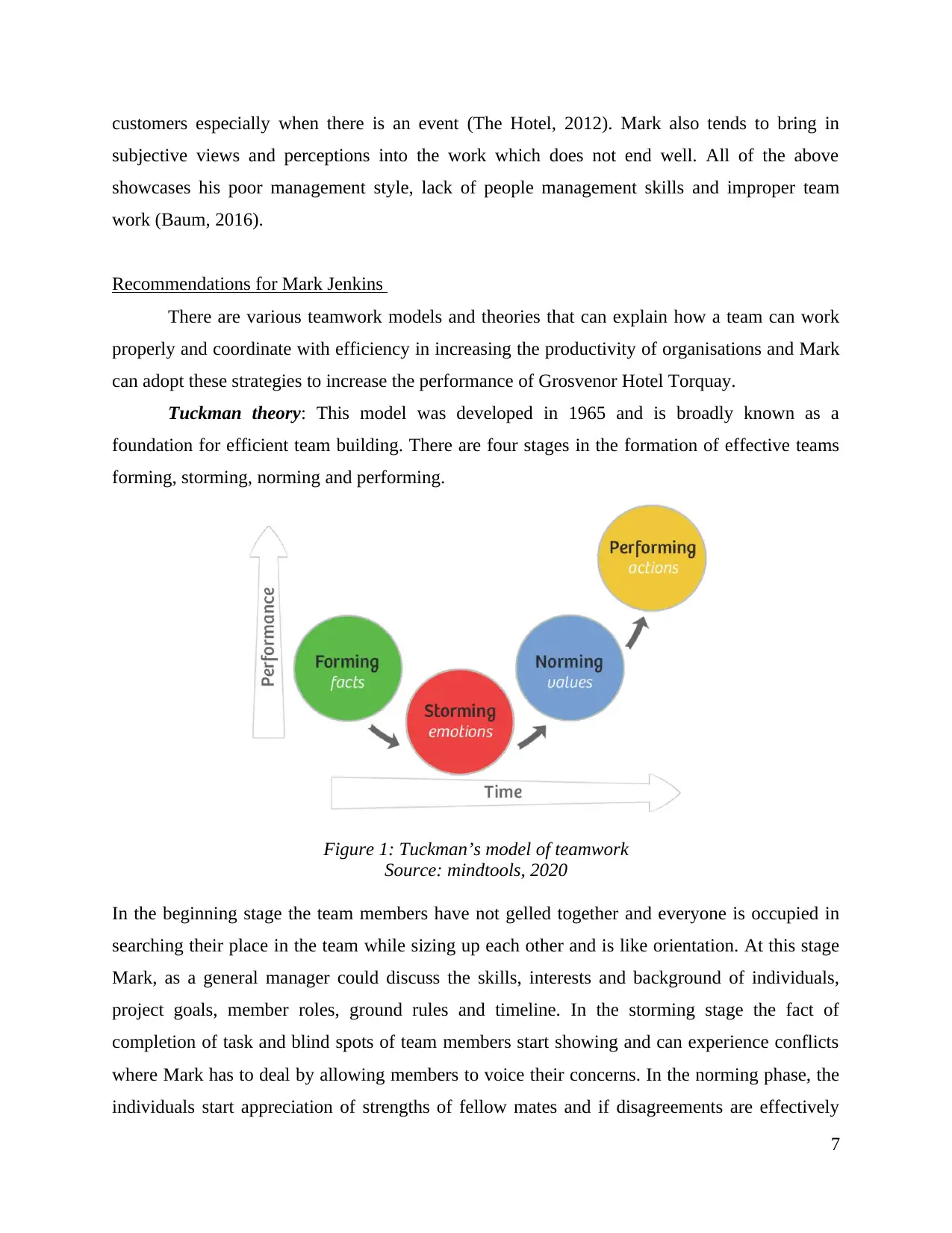
customers especially when there is an event (The Hotel, 2012). Mark also tends to bring in
subjective views and perceptions into the work which does not end well. All of the above
showcases his poor management style, lack of people management skills and improper team
work (Baum, 2016).
Recommendations for Mark Jenkins
There are various teamwork models and theories that can explain how a team can work
properly and coordinate with efficiency in increasing the productivity of organisations and Mark
can adopt these strategies to increase the performance of Grosvenor Hotel Torquay.
Tuckman theory: This model was developed in 1965 and is broadly known as a
foundation for efficient team building. There are four stages in the formation of effective teams
forming, storming, norming and performing.
Figure 1: Tuckman’s model of teamwork
Source: mindtools, 2020
In the beginning stage the team members have not gelled together and everyone is occupied in
searching their place in the team while sizing up each other and is like orientation. At this stage
Mark, as a general manager could discuss the skills, interests and background of individuals,
project goals, member roles, ground rules and timeline. In the storming stage the fact of
completion of task and blind spots of team members start showing and can experience conflicts
where Mark has to deal by allowing members to voice their concerns. In the norming phase, the
individuals start appreciation of strengths of fellow mates and if disagreements are effectively
7
subjective views and perceptions into the work which does not end well. All of the above
showcases his poor management style, lack of people management skills and improper team
work (Baum, 2016).
Recommendations for Mark Jenkins
There are various teamwork models and theories that can explain how a team can work
properly and coordinate with efficiency in increasing the productivity of organisations and Mark
can adopt these strategies to increase the performance of Grosvenor Hotel Torquay.
Tuckman theory: This model was developed in 1965 and is broadly known as a
foundation for efficient team building. There are four stages in the formation of effective teams
forming, storming, norming and performing.
Figure 1: Tuckman’s model of teamwork
Source: mindtools, 2020
In the beginning stage the team members have not gelled together and everyone is occupied in
searching their place in the team while sizing up each other and is like orientation. At this stage
Mark, as a general manager could discuss the skills, interests and background of individuals,
project goals, member roles, ground rules and timeline. In the storming stage the fact of
completion of task and blind spots of team members start showing and can experience conflicts
where Mark has to deal by allowing members to voice their concerns. In the norming phase, the
individuals start appreciation of strengths of fellow mates and if disagreements are effectively
7
Paraphrase This Document
Need a fresh take? Get an instant paraphrase of this document with our AI Paraphraser
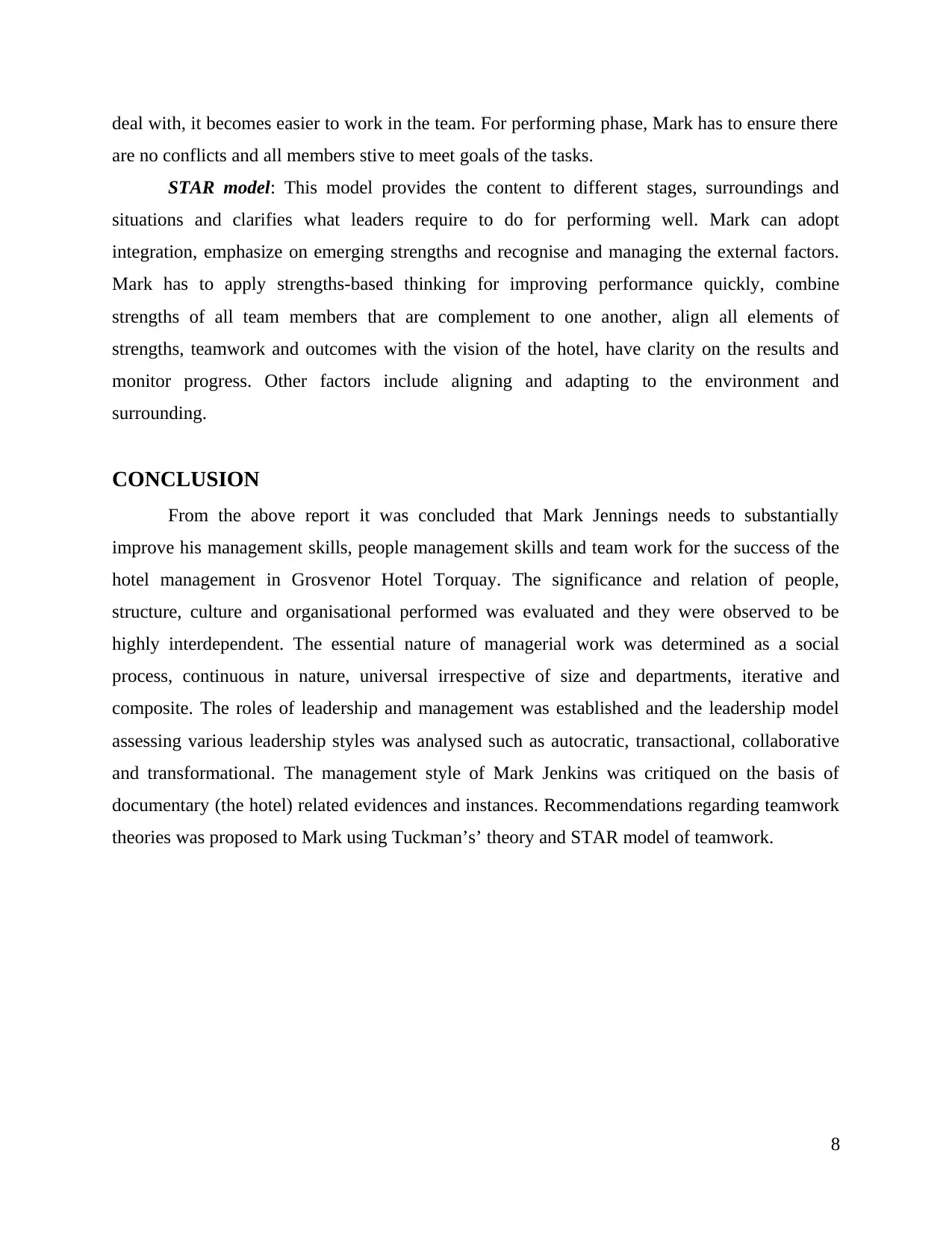
deal with, it becomes easier to work in the team. For performing phase, Mark has to ensure there
are no conflicts and all members stive to meet goals of the tasks.
STAR model: This model provides the content to different stages, surroundings and
situations and clarifies what leaders require to do for performing well. Mark can adopt
integration, emphasize on emerging strengths and recognise and managing the external factors.
Mark has to apply strengths-based thinking for improving performance quickly, combine
strengths of all team members that are complement to one another, align all elements of
strengths, teamwork and outcomes with the vision of the hotel, have clarity on the results and
monitor progress. Other factors include aligning and adapting to the environment and
surrounding.
CONCLUSION
From the above report it was concluded that Mark Jennings needs to substantially
improve his management skills, people management skills and team work for the success of the
hotel management in Grosvenor Hotel Torquay. The significance and relation of people,
structure, culture and organisational performed was evaluated and they were observed to be
highly interdependent. The essential nature of managerial work was determined as a social
process, continuous in nature, universal irrespective of size and departments, iterative and
composite. The roles of leadership and management was established and the leadership model
assessing various leadership styles was analysed such as autocratic, transactional, collaborative
and transformational. The management style of Mark Jenkins was critiqued on the basis of
documentary (the hotel) related evidences and instances. Recommendations regarding teamwork
theories was proposed to Mark using Tuckman’s’ theory and STAR model of teamwork.
8
are no conflicts and all members stive to meet goals of the tasks.
STAR model: This model provides the content to different stages, surroundings and
situations and clarifies what leaders require to do for performing well. Mark can adopt
integration, emphasize on emerging strengths and recognise and managing the external factors.
Mark has to apply strengths-based thinking for improving performance quickly, combine
strengths of all team members that are complement to one another, align all elements of
strengths, teamwork and outcomes with the vision of the hotel, have clarity on the results and
monitor progress. Other factors include aligning and adapting to the environment and
surrounding.
CONCLUSION
From the above report it was concluded that Mark Jennings needs to substantially
improve his management skills, people management skills and team work for the success of the
hotel management in Grosvenor Hotel Torquay. The significance and relation of people,
structure, culture and organisational performed was evaluated and they were observed to be
highly interdependent. The essential nature of managerial work was determined as a social
process, continuous in nature, universal irrespective of size and departments, iterative and
composite. The roles of leadership and management was established and the leadership model
assessing various leadership styles was analysed such as autocratic, transactional, collaborative
and transformational. The management style of Mark Jenkins was critiqued on the basis of
documentary (the hotel) related evidences and instances. Recommendations regarding teamwork
theories was proposed to Mark using Tuckman’s’ theory and STAR model of teamwork.
8
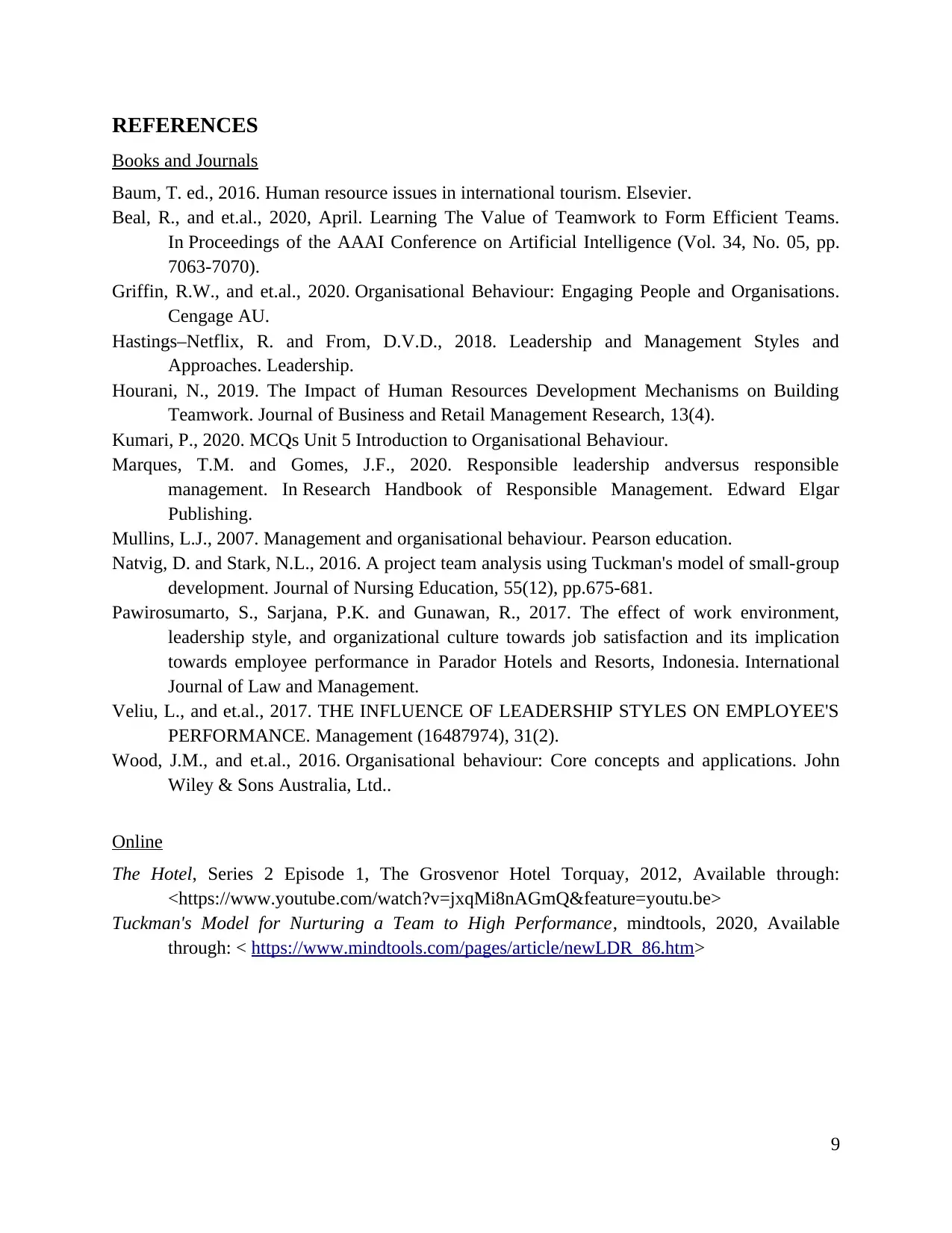
REFERENCES
Books and Journals
Baum, T. ed., 2016. Human resource issues in international tourism. Elsevier.
Beal, R., and et.al., 2020, April. Learning The Value of Teamwork to Form Efficient Teams.
In Proceedings of the AAAI Conference on Artificial Intelligence (Vol. 34, No. 05, pp.
7063-7070).
Griffin, R.W., and et.al., 2020. Organisational Behaviour: Engaging People and Organisations.
Cengage AU.
Hastings–Netflix, R. and From, D.V.D., 2018. Leadership and Management Styles and
Approaches. Leadership.
Hourani, N., 2019. The Impact of Human Resources Development Mechanisms on Building
Teamwork. Journal of Business and Retail Management Research, 13(4).
Kumari, P., 2020. MCQs Unit 5 Introduction to Organisational Behaviour.
Marques, T.M. and Gomes, J.F., 2020. Responsible leadership andversus responsible
management. In Research Handbook of Responsible Management. Edward Elgar
Publishing.
Mullins, L.J., 2007. Management and organisational behaviour. Pearson education.
Natvig, D. and Stark, N.L., 2016. A project team analysis using Tuckman's model of small-group
development. Journal of Nursing Education, 55(12), pp.675-681.
Pawirosumarto, S., Sarjana, P.K. and Gunawan, R., 2017. The effect of work environment,
leadership style, and organizational culture towards job satisfaction and its implication
towards employee performance in Parador Hotels and Resorts, Indonesia. International
Journal of Law and Management.
Veliu, L., and et.al., 2017. THE INFLUENCE OF LEADERSHIP STYLES ON EMPLOYEE'S
PERFORMANCE. Management (16487974), 31(2).
Wood, J.M., and et.al., 2016. Organisational behaviour: Core concepts and applications. John
Wiley & Sons Australia, Ltd..
Online
The Hotel, Series 2 Episode 1, The Grosvenor Hotel Torquay, 2012, Available through:
<https://www.youtube.com/watch?v=jxqMi8nAGmQ&feature=youtu.be>
Tuckman's Model for Nurturing a Team to High Performance, mindtools, 2020, Available
through: < https://www.mindtools.com/pages/article/newLDR_86.htm>
9
Books and Journals
Baum, T. ed., 2016. Human resource issues in international tourism. Elsevier.
Beal, R., and et.al., 2020, April. Learning The Value of Teamwork to Form Efficient Teams.
In Proceedings of the AAAI Conference on Artificial Intelligence (Vol. 34, No. 05, pp.
7063-7070).
Griffin, R.W., and et.al., 2020. Organisational Behaviour: Engaging People and Organisations.
Cengage AU.
Hastings–Netflix, R. and From, D.V.D., 2018. Leadership and Management Styles and
Approaches. Leadership.
Hourani, N., 2019. The Impact of Human Resources Development Mechanisms on Building
Teamwork. Journal of Business and Retail Management Research, 13(4).
Kumari, P., 2020. MCQs Unit 5 Introduction to Organisational Behaviour.
Marques, T.M. and Gomes, J.F., 2020. Responsible leadership andversus responsible
management. In Research Handbook of Responsible Management. Edward Elgar
Publishing.
Mullins, L.J., 2007. Management and organisational behaviour. Pearson education.
Natvig, D. and Stark, N.L., 2016. A project team analysis using Tuckman's model of small-group
development. Journal of Nursing Education, 55(12), pp.675-681.
Pawirosumarto, S., Sarjana, P.K. and Gunawan, R., 2017. The effect of work environment,
leadership style, and organizational culture towards job satisfaction and its implication
towards employee performance in Parador Hotels and Resorts, Indonesia. International
Journal of Law and Management.
Veliu, L., and et.al., 2017. THE INFLUENCE OF LEADERSHIP STYLES ON EMPLOYEE'S
PERFORMANCE. Management (16487974), 31(2).
Wood, J.M., and et.al., 2016. Organisational behaviour: Core concepts and applications. John
Wiley & Sons Australia, Ltd..
Online
The Hotel, Series 2 Episode 1, The Grosvenor Hotel Torquay, 2012, Available through:
<https://www.youtube.com/watch?v=jxqMi8nAGmQ&feature=youtu.be>
Tuckman's Model for Nurturing a Team to High Performance, mindtools, 2020, Available
through: < https://www.mindtools.com/pages/article/newLDR_86.htm>
9
⊘ This is a preview!⊘
Do you want full access?
Subscribe today to unlock all pages.

Trusted by 1+ million students worldwide
1 out of 9
Related Documents
Your All-in-One AI-Powered Toolkit for Academic Success.
+13062052269
info@desklib.com
Available 24*7 on WhatsApp / Email
![[object Object]](/_next/static/media/star-bottom.7253800d.svg)
Unlock your academic potential
Copyright © 2020–2025 A2Z Services. All Rights Reserved. Developed and managed by ZUCOL.




